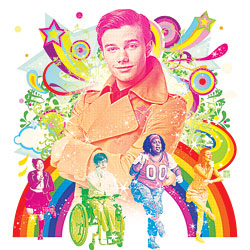
Last year, Fox’s series Glee pulled off a cunning trick, merging American Idol with name-your-guilty-pleasure teen show, but doing it smartly so no one felt guilty at all. The series was catnip for drama-club geeks, with a juicy-fruit ensemble and an arch, have-it-both-ways tone. It celebrated the underdogs, but was fueled by nasty zingers from the overdogs. Like co-creator Ryan Murphy’s excellent but short-lived series Popular, it was stocked full of power-addled divas. And if, as the first season progressed, the show’s shiny surfaces showed a few cracks (especially one too many pregnancies and an accompanying overemphasis on icy female scheming), the dialogue was sharp, the cast adorable—and every time the plot hit a wall in its emotional logic, there was a fantastic musical number to distract you.
The second half of the first season is off to a terrific start. They’ve jettisoned one pregnancy, and the other no longer involves a young man convinced his sperm impregnated a woman through a hot tub. They’ve added several great new faces, especially the incredible Idina Menzel (who I hope will be revealed as Rachel’s mother, given their resemblance); Jonathan Groff, from Spring Awakening, plays a seductive singer from competition Vocal Adrenaline; and grinning dynamo Kristin Chenoweth returns with her riff on Amy Sedaris’s Jerri Blank. Neil Patrick Harris is on his way, in an episode directed by Joss Whedon. And last week’s Madonna episode was a brassy little mini-masterpiece, reinterpreting the singer’s greatest hits as a sourcebook for third- (or fourth-) wave feminist self-esteem, climaxing in a strangely poignant whispered chorus of boys reciting the intro to “What It Feels Like for a Girl.”
For many viewers, the villainous cheerleading coach Sue Sylvester (Jane Lynch) has been the show’s breakout star. But Sue doesn’t interest me as much as Chris Colfer, who plays an effeminate boy named Kurt. With his arched eyebrow and disciplined moisturizer regime, Kurt has brothers across network and cable television, including Justin from the recently canceled (and deeply mourned) Ugly Betty and Marshall from United States of Tara. It’s no coincidence that both shows are, like Glee, highly stylized, with little interest in boring old realism. They are jewel boxes of attitude, perfect nesting grounds for their characters’ teen-queen sensibility, the mix of self-pity, self-mockery, and elbows-out self-assertion that is the purview of a certain kind of coming-out story.
This week’s episode (spoilers to come, people!) centers around Sue’s attempt to force Mercedes, the show’s “sassy black girl,” to lose weight. It’s a typical Glee mix of pleasurable nastiness inverted into equally pleasurable sentimentality: first a cavalcade of eating-disorder punch lines (“Once when I needed to lose weight for a cheerleading tournament, I had an elective hysterectomy”), then Mercedes’s thrilling performance of Christina Aguilera’s “Beautiful.” It’s a stirring story, but also slightly preachy and at times borderline obnoxious, which, for better or worse, is Glee’s trademark tone.
The episode’s other plot, which centers around Kurt, is much weirder, and less resolved. Kurt manipulates his father into dating the mother of hunky jock Finn (Cory Monteith), with a master plan to share a bedroom with his bewildered straight crush. In the process he sings a yearning performance of the sixties standard “A House Is Not a Home,” embarrassing Finn in front of his homophobic buddies. The number feels seductive, sweet, and also slightly creepy, given that Finn has no interest in him at all—and then it turns into something else, evoking Finn’s own feelings for his dead dad.
There have been other gay-teen plots, including the beautiful lesbian romance on Once and Again, and Rickie Vasquez on My So-Called Life. But there’s something at once original and old-fashioned about Glee’s evocation of doomed drag-queen longing in a young boy’s body. Kurt isn’t a sweet victim or a sassy sidekick: He’s a moral mixture, seizing center stage. Sometimes the role evokes the stereotypical evil queen, but more often it suggests early Barbra Streisand, whose classic medley of “House” with “One Less Bell to Answer” is referenced in the episode. For all Glee’s hip-hop references, Barbra is pretty much the show’s patron saint: the original homely underdog seducer, the outsider who was willing to violate the values of mere prettiness for a different kind of power. Like Madonna, Barbra deserves an episode of her own.
Glee
Fox.
Tuesdays at 9.